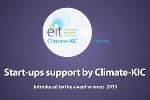ATLA - Adaptation Toolbox for Local Authorities
Challenge Platform: Adaptation Services
Project duration: 13/05/2013 – 13/05/2014 (1 year)
Lead partner: CLIMPACT-METNEXT
Project type: Pathfinder
Project lead: Pierre Chantry <pc@climpact.com>, Violaine Lepousez <vl@climpact.com>
Partners
The ATLA project involves 7 partners in 6 European countries:
- CLIMPACT-METNEXT, project leader (France)
- PIK – Potsdam Institute for Climate Impact Research (Germany)
- University of Valencia (Spain)
- Wrocław Research Centre EIT+ (Poland)
- Agenzia per l’energia e lo sviluppo sostenibile (Italy)
- Negos (Hungary)
- University of Kassel (Germany)
Concept
Adaptation Toolbox for Local Authorities (ATLA) is a pathfinder project to prepare the structuring of a climate adaptation services offer designed for addressing the specific needs of European local authorities. Sub-national actors play a forefront role in implementing climate change adaptation strategies and actions. This pathfinder project aims at mapping KIC partners’ resources & capabilities, especially from the LWEA & AS platforms, whose products & services could be relevant for local authorities. In parallel, RICs are solicited to help defining the actual needs. This pathfinder project allows the identification of the components of an innovative user-friendly toolbox for local authorities, that gathers products & services from KIC partners, in coherence with climate change adaptation methodological frameworks.
Overview

Main Tangible Outputs
- Consolidated analytical framework
- Analyses of experiences, existing services and needs
- Analyses of existing resources
- Proposition of an innovative user-oriented service structure and business model
The Role of Climate-KIC
In the development and design of the project, Climate-KIC helped to unite the lead partner, CLIMPACT-METNEXT, with the diversity of resources and partners they need to investigate and present the potential structure of a web-based toolbox for local adaptation strategies.
Because of the involvement of diverse communities in 7 countries across Europe (France, UK, Germany, Italy, Spain, Hungary, Poland) one of the biggest challenges was to ensure everyone was on board. Climate-KIC played a key role in helping to motivate people and to achieve mutual buy in across the locations. To gain the understanding needed to design the platform the project required a questionnaire to be sent to all local communities, so having people on the ground who
spoke these languages was essential.



